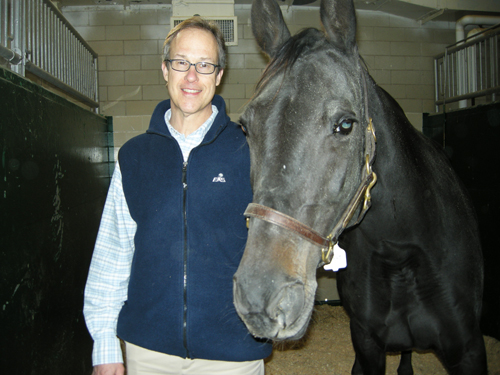
Although he didn’t ride horses when he was growing up, Lance Bassage always admired them. “They are gorgeous animals ─ powerful yet fragile at the same time.”
When he spent some time during summer breaks volunteering with a large-animal vet, he knew quickly that equine medicine would be his goal. “I found that I understood horses and got along with them,” Bassage says. He now brings that understanding of horses and nearly two decades of veterinary experience to the Ontario Veterinary College (OVC), where he will be working in the Large Animal Clinic providing both elective and emergency surgical care, as well as teaching OVC students.
Bassage grew up in Rochester, N.Y., and Washington, and earned his undergraduate degree in biology at Gettysburg College. During the summer, he worked at a small-animal clinic and volunteered one day a week with a large-animal vet. After graduation, he became the small-animal clinic’s full-time vet tech, and then returned to school at the University of Maryland to acquire the pre-vet courses he needed. He graduated from the University of Pennsylvania’s School of Veterinary Medicine in 1993, first in his class.
While he knew he wanted to work with horses, Bassage didn’t know he would like doing surgery until he began studying it. After graduating from the veterinary medicine program, he decided to do a one-year surgical internship, followed by a three-year residency in large-animal surgery, all at the University of Pennsylvania.
“I’d also become more and more interested in academic veterinary medicine,” Bassage adds. In 1997, he was hired as an assistant professor at Tufts University’s School of Veterinary Medicine and stayed there for four years. In 2001, he became assistant professor of equine surgery at the University of Illinois, but left a year later to work at Rhinebeck Equine in Rhinebeck, N.Y. At Rhinebeck, a team of vets provide a full range of health-care services for horses, from pre-purchase exams to surgery.
When Bassage arrived, Rhinebeck Equine had just changed from being a field practice ─ where the vets would travel to farms to evaluate and treat horses ─ to opening a hospital where surgeries and other treatments could be provided. Bassage’s expertise in surgery made it a good fit, but his heart was still in the academic life. “I thought I might stay there for a year or two,” he says, “but I ended up staying eight years. I really liked the area and the work, but I wanted to come back to a university setting.”
What he values about working in a university setting, he explains, is having opportunities for more intellectual discussions, having better facilities and diagnostic tools for the clinical work, and being able to teach.
He feels that OVC provides a great fit for the skills and specialized knowledge he brings. “I know I have a lot to contribute to the equine sports medicine side of the new facility being built at OVC,” he says. He also appreciates being close to Toronto and the Woodbine racecourse, since horse racing and racing-related injuries are a major interest.
Racehorses, he says, tend to have certain types of injuries more commonly than others: fractures of their joints, more extensive fractures involving the long bones in their legs, and tendon and ligament injuries. They also sometimes develop problems with their airways where some paralysis or damage to the upper respiratory tract makes it difficult for them to breathe normally.
Because of his clinical responsibilities in addition to teaching, research may be a smaller component of Bassage’s work. “Some of my research is related to orthopaedic surgery on horses, looking at surgical techniques, for example.”
He’s also interested in regenerative medicine, the use of stem cells and growth factors to promote healing of tissues and reduce scarring after injuries or surgery. “This is already an important technique,” Bassage explains. “We extract stem cells from the horse’s bone marrow and inject them into the tissue that is injured.” His research would seek to refine the technique by discovering how to do this most effectively in terms of timing and clinical applications.
Like the horses he admires, Bassage, who has competed in many triathlons, is a dedicated athlete. “My bike cost more than my car,” he jokes. He recently took a break from running, though, due to some knee problems, and is contemplating putting his focus more on swimming and biking.
When he’s not exercising, Bassage fills his free time with reading; he mentions John Grisham and Steve Berry as two of his favourite authors. He’s also working on settling into the Guelph community. “One thing I’ve found here,” he says, “is that people are very friendly, very down-to-earth, and very helpful. I never feel like I have to figure everything out on my own.”